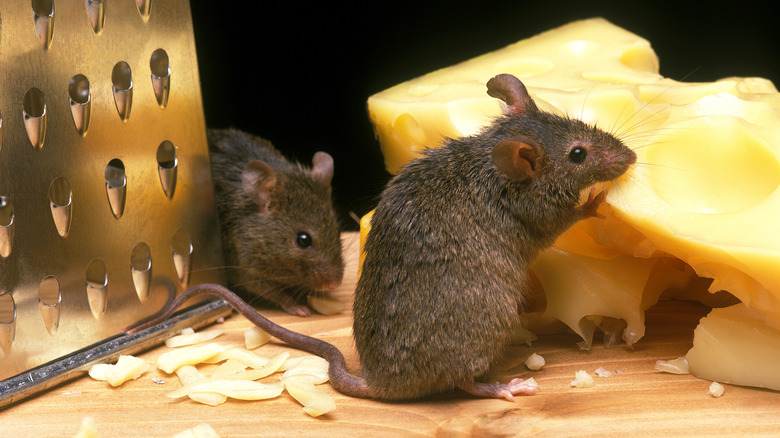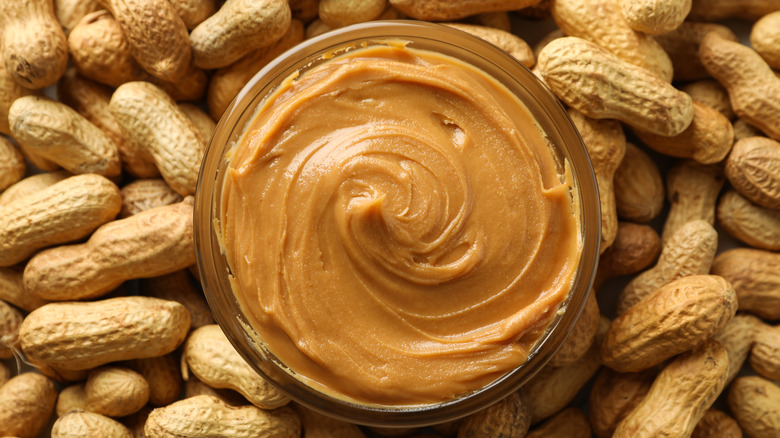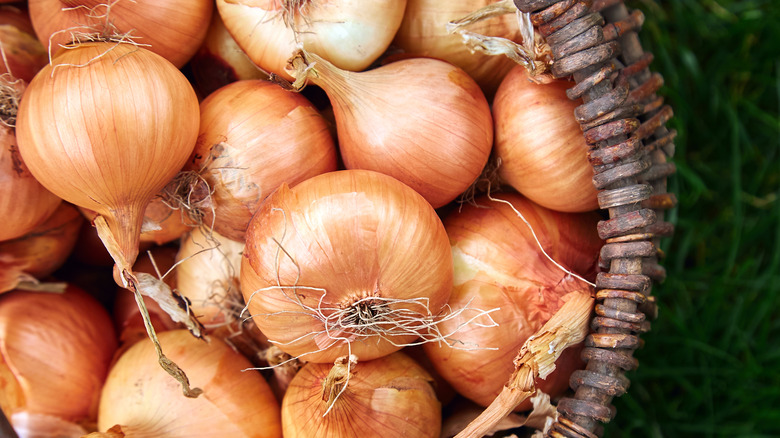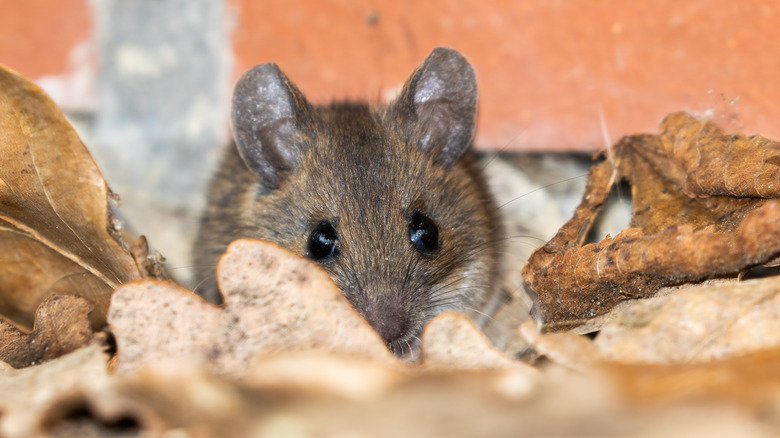How To Get Rid Of Mice Humanely
If you've ever dealt with rodents in your home, you know how difficult it can be to eliminate these pesky house guests. They have the ability to make their way into your walls and furniture, making even detecting their location an issue.
According to Orkan, mice can not only damage your home but can also spread disease –- particularly the hantavirus, which is common amongst most rodents. Mayo Clinic says the hantavirus is an infectious disease that, while rare, can get severe rapidly, starting with symptoms that resemble the flu. This disease can lead to life-threatening lung and heart problems.
You may be eager to use some of the common inhumane methods to get rid of mice, such as the ever-popular mouse traps, but there are actually several humane ways to rid your home of these rodents. Keep reading to find out how to get rid of mice with a more compassionate approach.
Peppermint
You might be surprised to learn that mice hate the smell of peppermint. The question is ... why? Victor explains that peppermint contains extremely potent menthol compounds that irritate a mouse's nasal cavity. If you choose to use peppermint, Chicago Tribune suggests spraying a mixture of 2 teaspoons of peppermint essential oil and 1 to 2 cups of water around the house. When spraying the mixture, the key is to focus on any potential entrance points, as well as any cracks or holes in the floor. Another trick is to douse a cotton ball or pad in the oil and stuff it into any place mice might be able to squeeze through.
To keep the peppermint scent potent, spray your mixture and replenish your soaked cotton pads a few times a week. This will ensure the peppermint's effectiveness at ridding your house of mice. You can also grow peppermint plants around the house, which will humanely drive mice away or deter them from even entering your home.
Peanut butter
While mice hate peppermint, they love peanut butter, which makes for a perfect DIY trap. To create and use this humane trap, Peta2 instructs to place dry oatmeal and peanut butter at the bottom of a bucket or trash can. Next, take a stack of books, magazines, or even bricks and place them on the side of the bucket. This is a way to get them into the bucket without giving them a way out. Once the mouse is in the trash can, place a towel over the top (this will calm the mouse) and gently release them outside (just make sure they're far enough away from your home to prevent them from coming back!).
According to Grove Collaborative, another way to use peanut butter is to skewer a plastic cup with a stick, then lay the stick across the top of the bucket. Put a glob of peanut butter on top of the cup to attract the mouse. When the mouse detects the peanut butter, it will run to it and fall into the bucket. Again, lay a towel over the bucket to calm them, then safely release them into the wild.
Remove all food sources
Besides seeking warmth, water, and shelter, one of the most common reasons mice make their way into our homes is to scour for food. These hungry rodents are on the hunt for any crumb they can get their tiny hands-on and will stop at nothing until they do. That being said, one of the easiest and most humane ways to get rid of mice is to cut off their food source, says Grove Collaborative.
This means not leaving food out on the counter, storing dry food in airtight containers, and reducing the number of crumbs in your house by eating at the table. If you have pets, it's a good idea to remove their food bowls once they've eaten. If you keep food out for them throughout the day, you may have to change things up until the mice are gone. Remember, no access to food means fewer greedy, pesky mice.
Cayenne pepper
Believe it or not, mice have an extremely keen sense of smell, which they use to sniff out food and find mates, so why not take advantage of their acute sense of smell and stop them with cayenne pepper? According to Pest Pointers, cayenne pepper contains capsaicin (the chemical that makes cayenne so spicy), which ruffles mice's little nose hairs and sends them straight out the door. To use the cayenne pepper method, sprinkle a good amount of cayenne pepper flakes wherever you've noticed mice, as well as any potential entrance points (those little guys are sneaky, so even if you think a space might be too small to pass through, sprinkle some cayenne there just to be safe).
If you have pets or children at home and are afraid they will find and ingest the cayenne pepper, Femina suggests wrapping the flakes in pieces of cloth (an old t-shirt will do) to keep them contained. As an added bonus, cayenne pepper not only gets rid of mice but other pests as well, such as roaches, ants, and other bugs.
Apple cider vinegar and water
Just like peppermint, mice can't stand the smell of apple cider vinegar, which is why Apollo X recommends cleaning your countertops and other surfaces of your house with a mixture of 50% apple cider vinegar and 50% water (don't worry if the apple cider vinegar isn't organic -– any kind will do). This method works for both indoor and outdoor spaces, which means you can use it to get rid of bugs and insects too.
Cleaning your house with this apple cider vinegar solution will work to repel the mice, which is what makes it a great humane way to get rid of these pesky critters in your home. However, it's important to note that this method isn't 100% reliable, so if you continue to find mice droppings or other signs of mice in your home, it may be a good to visit another method on our list or use it in conjunction with one of the others.
Onions
If you haven't guessed by now, mice hate strong smells, which is why we recommend using onions to get rid of them. Besides making an excellent burger topping, onions are a natural bug repellent because of their pungent smell. Her Zindagi says that onions have antibacterial sulfide components, which tend to ward off mice, bugs, and insects.
To use the onion method, cut open an onion and place it wherever you've seen mice droppings or other signs of the rodent. Make sure to replace the onion once it starts to rot, and keep it away from your pets. According to Bloorcourt Veterinary Clinic, onions are highly toxic to dogs and cats. Ingesting them may lead to gastroenteritis (nausea, vomiting, and diarrhea) or, in more serious cases, the rupturing of red blood cells, so be mindful of where you place them. You want to get rid of the mouse, not your beloved pet.
Work from the outside in
The best way to solve a problem is to prevent it from happening. Sealing your trash cans is an effective way to keep mice from entering your home in the first place, according to Rodents Stop. As we mentioned earlier, mice have a great sense of smell, so a trash can is basically an invitation for mice and other critters to come into your home (and never leave). The best way to prevent the smells from leaking out is by sealing your trash can with an air-proof lid. If you don't have access to one, securing your lids with a bungee cord should do the trick.
If you can, keep your trash cans far away from your house. Having your trash can in your garage or directly next to your home makes it easier for mice to make their way inside. The same rule goes for bird feeders -– while they attract your favorite birds, they also attract mice and rats, so place your bird feeder near the back of your property or as far away as you can.
Use the rich scent of cinnamon
Much like peppermint and cayenne pepper, cinnamon has an overwhelming smell that sends mice scurrying away. You're probably already aware of how potent cinnamon is, as many people use it to jazz up their recipes and spice up homemade candles with a warm, charming scent. The chemical compound in cinnamon is cinnamic aldehyde, which is strong enough to be off-putting for some humans. Therefore, it's unsurprising that it's also overwhelming for mice with their extremely sensitive noses and additional sensory organs. A 2018 study at Cornell University even revealed that high doses of this spice are fatal to rodents, which also explains why mice avoid the ingredient.
This easily obtainable spice is a cheap and effective way to deter mice. You can scatter cinnamon sticks, powder, or oil throughout your home and in places you suspect mice trespass through. However, the methods of laying out cinnamon sticks and tying up cinnamon powder in small sachet bags are only semi-effective.
If you want guaranteed results, you should use cinnamon oil. Soak cotton balls in these spicy-scented essential oils, and lay them in areas you know mice frequent. Remember to swap out the cotton balls every two to three weeks to keep the cinnamic aldehyde potent and effective at keeping local rodent populations at bay.








